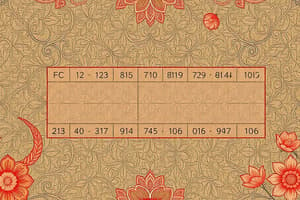Podcast
Questions and Answers
What is the volume of a rectangular tank with the dimensions length = 48 inches, width = 24 inches, and depth = 15 inches, in cubic feet?
What is the volume of a rectangular tank with the dimensions length = 48 inches, width = 24 inches, and depth = 15 inches, in cubic feet?
- 8.0 cubic feet (correct)
- 12.5 cubic feet
- 6.5 cubic feet
- 10.0 cubic feet
If a cubic tank has a volume of 1,500 cubic inches, how many gallons does it hold?
If a cubic tank has a volume of 1,500 cubic inches, how many gallons does it hold?
- 6.5 gallons (correct)
- 5.0 gallons
- 8.75 gallons
- 7.0 gallons
What is the volume in cubic inches of a tank with dimensions length = 54 inches, width = 20 inches, and depth = 18 inches?
What is the volume in cubic inches of a tank with dimensions length = 54 inches, width = 20 inches, and depth = 18 inches?
- 12,960 cubic inches
- 19,440 cubic inches (correct)
- 9,720 cubic inches
- 15,840 cubic inches
Which conversion is correct if a tank's volume is calculated to be 10 cubic feet?
Which conversion is correct if a tank's volume is calculated to be 10 cubic feet?
A fuel tank measures 120 inches in length, 60 inches in width, and 30 inches in depth. What is its volume in gallons?
A fuel tank measures 120 inches in length, 60 inches in width, and 30 inches in depth. What is its volume in gallons?
What is the area of the triangle formed by the base of 4 inches and height of 3 inches?
What is the area of the triangle formed by the base of 4 inches and height of 3 inches?
How do you calculate the area of a trapezoid when the lengths of the bases are 4 feet and 6 feet and the height is 2 feet?
How do you calculate the area of a trapezoid when the lengths of the bases are 4 feet and 6 feet and the height is 2 feet?
What is the formula for calculating the force exerted on a piston if the area is 1.2 square inches and the pressure is 850 PSI?
What is the formula for calculating the force exerted on a piston if the area is 1.2 square inches and the pressure is 850 PSI?
What is the piston displacement for a master cylinder with a diameter of 1.5 inches and a stroke of 4 inches?
What is the piston displacement for a master cylinder with a diameter of 1.5 inches and a stroke of 4 inches?
What does the total piston displacement in a reciprocating engine represent?
What does the total piston displacement in a reciprocating engine represent?
If the altitude of a triangle is doubled and the base remains constant, how will the area change?
If the altitude of a triangle is doubled and the base remains constant, how will the area change?
What is the average length of the two bases in a trapezoid if one base is 4 feet and the other is 6 feet?
What is the average length of the two bases in a trapezoid if one base is 4 feet and the other is 6 feet?
Which statement about the area of a triangle is true if the height is 10 inches and the base is 5 inches?
Which statement about the area of a triangle is true if the height is 10 inches and the base is 5 inches?
Flashcards
Fuel Tank Volume
Fuel Tank Volume
The total amount of space inside a fuel tank, measured in cubic units (e.g., cubic inches, cubic feet).
Cubic Volume Conversion
Cubic Volume Conversion
Changing the measurement of volume from one cubic unit to another (e.g., cubic inches to cubic feet).
Gallon Conversion
Gallon Conversion
Changing the measurement of volume from cubic units (like cubic feet) to gallons.
Rectangular Tank Volume
Rectangular Tank Volume
Signup and view all the flashcards
Volume Units Conversion
Volume Units Conversion
Signup and view all the flashcards
Triangle Area
Triangle Area
Signup and view all the flashcards
Trapezoid Area
Trapezoid Area
Signup and view all the flashcards
Hydraulic Force
Hydraulic Force
Signup and view all the flashcards
Piston Displacement
Piston Displacement
Signup and view all the flashcards
Circle Area
Circle Area
Signup and view all the flashcards
Reciprocating Engine Displacement
Reciprocating Engine Displacement
Signup and view all the flashcards
Hydraulic Pressure
Hydraulic Pressure
Signup and view all the flashcards
Piston Stroke
Piston Stroke
Signup and view all the flashcards
Study Notes
Volume of Rectangular Solids
- To find the volume of a rectangular solid, multiply its length, width, and depth.
- All dimensions must be in the same units.
- Example: A rectangular fuel tank measures 3 feet in length, 2 feet in width, and 12 inches in depth. Convert all measurements to inches: 3 ft * 12 in/ft = 36 inches, 2 ft * 12 in/ft = 24 inches.
- Volume = 36 in * 24 in * 12 in = 10,368 cubic inches.
- 1 cubic foot = 1728 cubic inches. Converting the volume to cubic feet: 10,368 cu in / 1728 cu in/cu ft = 6 cubic feet.
Volume and Capacity
- Volume is the amount of space occupied by an object.
- Capacity is the maximum amount a container can hold.
- Volume is often measured in cubic units (cubic feet, cubic inches, etc).
- Capacity is often measured in units of liquid volume (gallons, liters, etc).
- 1 cubic foot = 7.5 gallons (approximately).
- To convert volume to capacity, divide the volume by the conversion factor.
Working with Units of Measurement
- Ensure units are consistent throughout calculations.
- Use appropriate conversion factors (e.g., feet to inches, gallons to cubic feet).
Studying That Suits You
Use AI to generate personalized quizzes and flashcards to suit your learning preferences.



